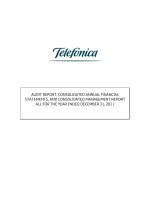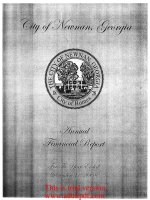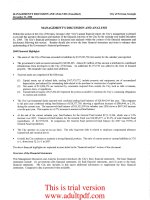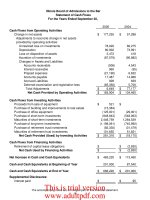Office of the Attorney General Financial and Compliance Audit For the Two Years Ended December 31, 1998 September 1999 Office of the Attorney General Financial and Compliance Audit For the Two Years Ended December 31, 1998 September 1999 _part1 potx
Bạn đang xem bản rút gọn của tài liệu. Xem và tải ngay bản đầy đủ của tài liệu tại đây (216.58 KB, 10 trang )
Office of the Attorney General
Financial and Compliance Audit
For the Two Years Ended December 31, 1998
September 1999
Financial Audit Division
Office of the Legislative Auditor
State of Minnesota
99-49
Centennial Office Building, Saint Paul, MN 55155 651/296-4708
This document can be made available in
alternative formats, such as large print,
Braille, or audio tape, by calling 296-1727
SUMMARY
State of Minnesota
Office of the Legislative Auditor
1st Floor Centennial Building
658 Cedar Street • St. Paul, MN 55155
(651)296-1727 • FAX (651)296-4712
TDD Relay: 1-800-627-3529
email:
URL:
Office of the Attorney General
Financial and Compliance Audit
For the Two Years Ended December 31, 1998
Public Release Date: September 10, 1999 No. 99-49
Background Information
The Office of the Attorney General was established by Article V of the constitution of the State
of Minnesota. During the audit period, Hubert H. Humphrey III was the Attorney General.
Mike Hatch is the current Attorney General. The Attorney General's main duties include
providing legal advice, representing state agencies and their officials, and offering direct
assistance to citizens of Minnesota. The Attorney General also represents Minnesota in civil and
criminal cases and is a member of the Executive Council, the Pardons Board, the Land Exchange
Board, and the State Board of Investment.
Objectives and Conclusions
The objectives of our audit were to gain an understanding of the internal control structure over
the accounting and reporting of financial activities of the agency and to determine if the Office of
the Attorney General complied with material finance-related legal provisions. The areas covered
by our audit were partner agency agreements, fines and restitutions, tobacco settlement receipts,
payroll, rent, claims, professional/technical services, and supply and equipment purchases for the
period January 1, 1997, through December 31, 1998.
The Attorney General’s Office (AGO) properly collected, deposited, and recorded revenues for
attorney general services, fines, and restitutions on the state’s accounting system. The AGO also
adequately supported and accurately recorded its payroll and other expenditures in the state’s
accounting records. In addition, for the items tested, the AGO complied with material finance-
related legal provisions and bargaining unit agreements. However, the AGO did not bill for the
full cost of services for non-general funded activities.
The Attorney General responded that his office will continue to work with the Department of
Finance to determine appropriate funding for the AGO, including the issue of billing for the full
cost of services for non-general funded activities.
STATE OF MINNESOTA
OFFICE OF THE LEGISLATIVE AUDITOR
JAMES R. NOBLES, LEGISLATIVE AUDITOR
Representative Dan McElroy, Chair
Legislative Audit Commission
Members of the Legislative Audit Commission
The Honorable Mike Hatch
Attorney General
We have audited the Office of the Attorney General for the period January 1, 1997, through
December 31, 1998, as further explained in Chapter 1. Our audit scope included revenues from
partner agreements, fines and restitutions, payroll, rent, claims, professional/technical services,
supplies, and equipment.
We conducted our audit in accordance with generally accepted auditing standards and
Government Auditing Standards, as issued by the Comptroller General of the United States.
Those standards require that we obtain an understanding of management controls relevant to the
audit. The standards also require that we design the audit to provide reasonable assurance that
the Office of the Attorney General complied with provisions of laws, regulations, and contracts
significant to the audit. The management of the Office of the Attorney General is responsible for
establishing and maintaining the internal control structure and for compliance with applicable
laws, regulations, and contracts.
This report is intended for the information of the Legislative Audit Commission and the
management of the Office of the Attorney General. This restriction is not intended to limit the
distribution of this report, which was issued as a public document on September 10, 1999.
James R. Nobles Claudia J. Gudvangen, CPA
Legislative Auditor Deputy Legislative Auditor
End of Fieldwork: April 2, 1999
Report Signed On: September 3, 1999
1ST FLOOR SOUTH, CENTENNIAL BUILDING 658 CEDAR STREET ST. PAUL, MN 55155
TELEPHONE 651/296-4708 TDD RELAY 651/297-5353 FAX 651/296-4712 WEB SITE
Office of the Attorney General
Table of Contents
Page
Chapter 1. Introduction 1
Chapter 2. Funding Sources and Other Revenues 3
Chapter 3. Payroll and Other Expenditures 8
Status of Prior Audit Issues 9
Office of the Attorney General Response 10
Audit Participation
The following members of the Office of the Legislative Auditor prepared this report:
Claudia Gudvangen, CPA Deputy Legislative Auditor
Thomas Donahue, CPA, Audit Manager
Tony Toscano Auditor-in-Charge
Susan Kachelmeyer, CPA Senior Auditor
Brian Swartz Auditor
Exit Conference
We discussed the results of the audit with the following staff of the Office of the Attorney General
at an exit conference held on August 31, 1999:
Mike Hatch Attorney General
Rebecca Spartz Director of Administration
Terence Pohlkamp Fiscal Services Director
Sandra Caron Human Resources Director
Patricia Gallatin Docketing Supervisor
Office of the Attorney General
1
Chapter 1. Introduction
The Office of the Attorney General (AGO) was established by Article V of the constitution of
the State of Minnesota. Among the activities the AGO lists in its mission statement are:
• to protect the interests of the citizens of Minnesota by enforcing the laws enacted by the
Legislature,
• to defend the state in all legal proceedings, and
• to ensure the legality of government action.
The Attorney General also represents Minnesota in civil and criminal cases and is a member of
the Executive Council, the Pardons Board, the Land Exchange Board, and the State Board of
Investment. Hubert H. Humphrey III was the Attorney General during the time period covered
by this audit. Mike Hatch was elected Minnesota’s Attorney General in November 1998 and
took office on January 4, 1999.
Table 1-1 provides a summary of the AGO’s expenditure activity for fiscal year 1998.
Table 1-1
Summary of Expenditures by Fund
Fiscal Year 1998
General
Fund
Special
Revenue Fund
Other
Funds
Expenditures:
Payroll $26,845,932 $1,283,267 $174,814
Rent 2,660,144 54,003 2,716
Claims 132,029 34,123 938,026
Supplies 771,595 36,766 12,214
Equipment 573,016 20,809 590
Professional/Technical Services 456,100 56,894 27,988
Other 1,312,730 272,963 88,463
Total $32,751,546 $1,758,825 $1,244,812
Source: Financial information obtained from the state’s accounting system.
On May 8, 1998, the Attorney General’s Office, on behalf of the State of Minnesota, reached an
out-of-court settlement with the tobacco industry. As a result of that court-approved settlement,
the State of Minnesota was awarded approximately $6.4 billion to be distributed over 25 years.
Also, in accordance with the settlement, the court approved the establishment of the Minnesota
Partnership for Action Against Tobacco (MPAAT), a nonprofit organization created to
administer two antismoking program accounts: the national research account and the smoking
cessation account. In addition, the settlement directed the tobacco industry to fund the accounts
Office of the Attorney General
2
$100 million and $102 million, respectively. The AGO provided temporary administrative
support to MPAAT during the latter six months of the audit period.
On behalf of MPAAT, the AGO received $10 million for the national research account in June
1998. These funds represented the first of ten annual payments of $10 million each June 1
st
through June 1, 2007. The AGO transferred these funds, plus interest, to MPAAT by the end of
1998. In the future, payments to the national research account will go directly to MPAAT. The
smoking cessation account was funded by a one-time lump sum payment of $102 million. The
tobacco industry paid the lump sum directly to MPAAT in December 1998.
In September 1998, the AGO received $240 million in tobacco settlement funds and deposited
them to the state’s General Fund. The Attorney General’s Office does not have access to
tobacco settlement funds for its own use.
Office of the Attorney General
3
Chapter 2. Funding Sources and Other Revenues
Chapter Conclusions
The Attorney General’s Office (AGO) properly collected, deposited, and
recorded revenues for AGO services, fines, and restitutions on the state’s
accounting system. In addition, except for the following issue, for the items
tested, the AGO complied with material finance-related legal provisions. The
AGO did not bill for the full cost of services for non-general funded activities.
Funding of AGO services has been and continues to be an evolving process. The process has
included input from many agencies with differing viewpoints and perspectives: the Legislature,
the Attorney General’s Office, the Department of Finance, state departments and agencies, and
other constituencies served by the AGO. During the audit period, the 1998 Legislature directed
the commissioner of Finance and the AGO to convene a joint task force to evaluate: the
availability of legal services; the adequacy and suitability of the current mechanism for funding
legal services; the appropriateness of billing rates; and the appropriateness of the current process
for setting billing rates.
Currently, AGO services are funded through direct appropriations from the Legislature and
agreements with various state departments and agencies. Under Minn. Stat. Section 8.15,
Subdivision 3, the AGO has the authority to enter into agreements with state departments and
agencies for legal services. During fiscal year 1998, the AGO received a General Fund
appropriation of $25.3 million and collected approximately $8.5 million through agreements
with state agencies to fund its operations.
Funding for AGO services begins with the budgetary process. The budget of the AGO
represents the operating costs of the AGO, including the cost of legal services provided to state
agencies, quasi-state agencies and political subdivisions that are not otherwise provided for
within the budget of a state agency. The cost for legal services to a state agency that has an
agreement with the AGO is generally provided for within that agency’s budget.
A state agency under contract with the AGO may be classified as either a full-partner or semi-
partner agency. Generally, a full-partner agency bears the cost of AGO services through its
operating budget. The full-partner agreement reflects the estimated annual cost of providing
legal services. The AGO and the agency work together to determine what legal services are
needed and the appropriate number of attorney and legal assistant hours to be charged. Semi-
partner agencies are those agencies that receive services from the AGO through the AGO’s
appropriation but need additional services and enter into agreements to fund those services.
State agencies that do not have an agreement for legal services are referred to as “pooled
agencies.” Legal services provided to pooled agencies are funded through the AGO’s
appropriation.
Office of the Attorney General
4
During fiscal year 1998, the AGO had agreements in place with eight partner agencies and eight
semi-partner agencies. As shown in Table 2-1, the AGO received approximately $8.48 million
from partner agencies under the full and semi-partner agreements during fiscal year 1998. Legal
services actually provided under those agreements was approximately $8.43 million.
Approximately once a quarter, a partner agency pays the AGO for a portion of the agreed upon
legal services. The terms of the individual agreements determine when and how an agency pays
the AGO. During the audit period, partner agencies either paid by state payment vouchers or
appropriation transfers. In accordance with Minn. Stat. Section 8.15, Subd. 3, funds received
under the agreements were collected and deposited to the General Fund and were appropriated to
the AGO.
Table 2-1
Full and Semi-Partner Agreements
Fiscal Year 1998
Agency
Partner
Status
Services
Provided Under
Agreement
Partner
Payments per
Agreement
Risk Management. Full $ 33,343 $ 32,343
Agricultural Utilization Research Institute Full 7,031 14,280
Department of Children, Families, & Learning Semi 634,182 543,750
Department of Corrections Semi 228,048 105,000
Department of Finance Full 589,789 597,680
Department of Health Semi 755,280 711,845
Housing Finance Agency Semi 105,247 78,132
Department of Human Services Semi 1,519,607 1,567,780
Medical Practices Board Full 1,445,065 1,416,000
MnSCU Full 1,101,749 1,157,250
Department of Natural Resources Full 848,200 1,036,698
Department of Administration, Office of Technology Full 19,797 84,000
Petroleum Tank Release Compensation Board. Full 120,092 105,000
Pollution Control Agency Semi 708,391 733,244
Department of Public Safety Semi 115,899 105,000
Department of Transportation Semi 194,348 198,220
Total $8,426,068 $8,486,222
Source: Auditor prepared from AGO billing system and partner agency agreements.
As a general rule, the AGO does not “settle up” at fiscal year end with partner agencies that
either paid too much or too little for services. The agreements reflect a degree of uncertainty at
the time they are established as to the extent of future legal services required. However, in
certain circumstances, the AGO has adjusted partner agreement amounts to more closely
represent the actual level of services provided. Overall, as shown in Table 2-1, for fiscal year
1998, the amount collected for legal services exceeded the cost for legal services provided by
approximately $57,000 or less than one-half of one percent.
The AGO maintained a billing and accounts receivable system during the audit period to track
attorney and legal assistant charges. Approximately once a month, the AGO sent out invoices
and information reports to semi-partner and pooled agencies for non-general funded activities.
Office of the Attorney General
5
During fiscal year 1998, semi-partner and pooled agencies reimbursed the General Fund
approximately $5.4 million. These funds were deposited to the General Fund as non-dedicated
revenue in accordance with Minn. Stat. Section 8.15, Subd. 5. Full-partner agencies pay
according to their agreements. All agencies receiving AGO services, including full-partner
agencies, receive the information reports. The agencies use the reports to monitor the legal
services provided.
During the audit period, the following hourly rates were charged for AGO services under the
partner agreements, as shown in Table 2-2:
Table 2-2
AGO Billing Rates
Fiscal Year
1997 1998 1999
Attorneys $62 $70 $79
Legal Assistants $46 $55 $60
Source: These rates were determined in consultation with the commissioner of Finance as required by Minn. Stat. Section 8.15,
Subd. 1.
The AGO monitors semi-partner and pooled agencies to ensure that the General Fund is
reimbursed appropriately. However, we noted that for one agency, the prior year account
receivable balance as of December 31, 1998, was approximately $1.1 million. According to the
AGO, the Department of Pubic Safety (DPS) owed the General Fund approximately $900,000
and $200,000 for legal services provided in fiscal years 1998 and 1997, respectively. The
amounts were payable from the Trunk Highway Fund. The AGO indicated that the department
was seeking additional appropriations in its 2000/2001 biennial budget to reimburse the General
Fund. The 1999 Legislature did not approve DPS’s appropriation request for Trunk Highway
Fund monies to either reimburse the General Fund for past AGO services or future AGO service
costs.
Additionally, the AGO collected fines and restitutions as a result of cases prosecuted during the
audit period. Total fines and restitutions collected during the audit period were approximately
$3.5 million of which approximately $2.1 million was deposited to the General Fund as a
nondedicated receipt.
Audit Objectives and Methodology
Our review of AGO funding sources and revenues focused on the following questions:
• Did the AGO design and implement internal controls to provide reasonable assurance that
revenues for AGO services, fines, and restitutions were properly collected, deposited, and
accounted for in the state’s accounting system?
• Did the AGO comply with material finance-related legal provisions?
To answer these questions, we interviewed agency employees to gain an understanding of the
internal controls over revenues generated under partner agreements, billings to non-partner
Office of the Attorney General
6
agencies, fines, and restitutions. We reviewed partner agency agreements and state accounting
records to determine if the AGO received all the revenues it was entitled to receive under the
agreements. We reviewed the AGO’s determination of its attorney and legal assistant billing
rates to determine if the process was systematic and reasonable. We also reviewed AGO records
to determine that it properly accounted for all fines and restitutions.
Conclusions
The Attorney General’s Office properly collected, deposited, and recorded revenues for AGO
services, fines, and restitutions on the state’s accounting system. In addition, except for the
following issue, for the items tested, the AGO complied with material finance-related legal
provisions. As explained in Finding 1, the AGO did not bill for the full cost of services for non-
general funded activities.
1. The AGO did not bill its full cost for legal services provide d to state agencies for non-
general funded activities.
Currently, the AGO uses a calculated hourly billing rate for attorney and legal assistants as the
mechanism to recover the full cost of legal services provided. For fiscal year 1998, the AGO
calculated a billing rate of $76.50 per hour for attorneys and $58 per hour for legal assistants to
recover full cost. However, there was a difference of opinion between the AGO and the
Department of Finance in interpreting the meaning of “full cost of services” pursuant to Minn.
Stat. Section 8.15, Subd. 5, and determining which costs should be included in the billing rate.
The AGO adjusted its fiscal year 1998 billing rates for attorneys and legal assistants to $70 per
hour and $55 per hour, respectively. For fiscal year 1999, the AGO, in consultation with the
Department of Finance, “agreed” to a billing rate that was calculated without the inclusion of
rent as a cost factor.
Minn. Stat. Section 8.15, Subd. 1, provides that the AGO, in consultation with the commissioner
of Finance shall develop a fee schedule to be used by the AGO in developing the (partner)
agreements. Minn. Stat. Section 8.15, Subd. 5, provides that:
State agencies receiving legal services from the attorney general for nongeneral
funded activities shall reimburse the full cost of those services to the general fund
based on periodic billings prepared by the attorney general. Payment must be
made to the attorney general for deposit to the general fund as a nondedicated
receipt. The attorney general, in consultation with the commissioner of finance,
shall develop reimbursement policies and procedures related to legal services.
As a practical matter, the AGO has developed a single billing rate for attorneys and legal
assistants to serve as the rate used in the partner agreements and to bill other agencies the “full
cost” of legal services provided for non-general funded activities. The billing rates used in the
partner agreements are negotiated in consultation with the commissioner of Finance. The AGO
and the Department of Finance believe that the billing rates used in the partner/semi-partner
agreements under Minn. Stat. Section 8.15, Subd. 3, are not required to recover full cost. The
rates used exclude rent, which is considered to be a fixed cost.









